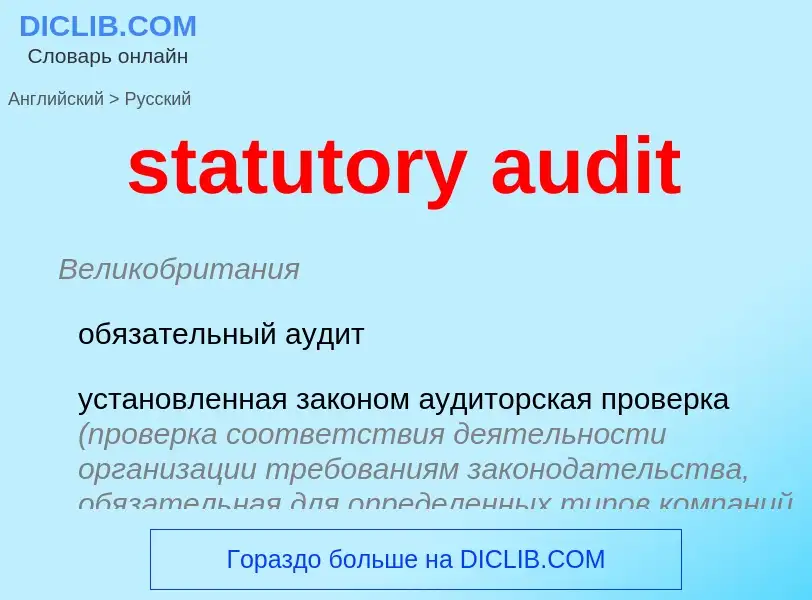Μετάφραση και ανάλυση λέξεων από την τεχνητή νοημοσύνη ChatGPT
Σε αυτήν τη σελίδα μπορείτε να λάβετε μια λεπτομερή ανάλυση μιας λέξης ή μιας φράσης, η οποία δημιουργήθηκε χρησιμοποιώντας το ChatGPT, την καλύτερη τεχνολογία τεχνητής νοημοσύνης μέχρι σήμερα:
- πώς χρησιμοποιείται η λέξη
- συχνότητα χρήσης
- χρησιμοποιείται πιο συχνά στον προφορικό ή γραπτό λόγο
- επιλογές μετάφρασης λέξεων
- παραδείγματα χρήσης (πολλές φράσεις με μετάφραση)
- ετυμολογία
statutory audit - translation to Αγγλικά
Великобритания
обязательный аудит
установленная законом аудиторская проверка (проверка соответствия деятельности организации требованиям законодательства, обязательная для определенных типов компаний в соответствии с законом "О компаниях" 1985 г.; проводится независимыми компетентными лицами)
Смотрите также
аудит
возможность проведения аудита (наличие условий для проведения аудита, в том числе хорошее состояние бухгалтерских документов, готовность бухгалтерского персонала компании сотрудничать, наличие хорошей системы внутреннего контроля и т. п.)
Смотрите также
Βικιπαίδεια

An audit is an "independent examination of financial information of any entity, whether profit oriented or not, irrespective of its size or legal form when such an examination is conducted with a view to express an opinion thereon.” Auditing also attempts to ensure that the books of accounts are properly maintained by the concern as required by law. Auditors consider the propositions before them, obtain evidence, and evaluate the propositions in their auditing report.
Audits provide third-party assurance to various stakeholders that the subject matter is free from material misstatement. The term is most frequently applied to audits of the financial information relating to a legal person. Other commonly audited areas include: secretarial and compliance, internal controls, quality management, project management, water management, and energy conservation. As a result of an audit, stakeholders may evaluate and improve the effectiveness of risk management, control, and governance over the subject matter.
Auditing has been a safeguard measure since ancient times, and has since expanded to encompass so many areas in the public and corporate sectors that academics have started identifying an "Audit Society".



